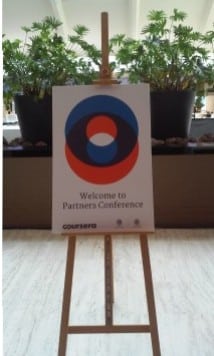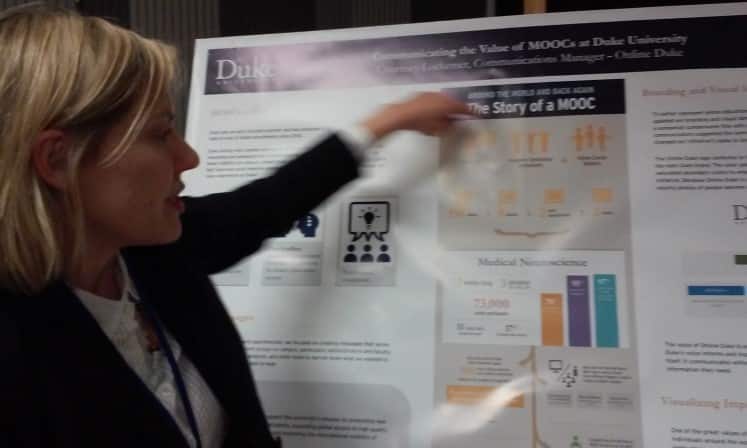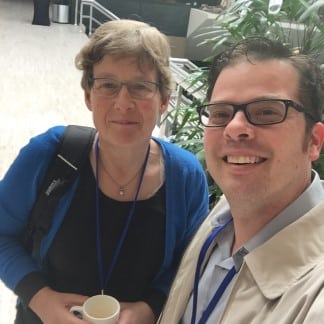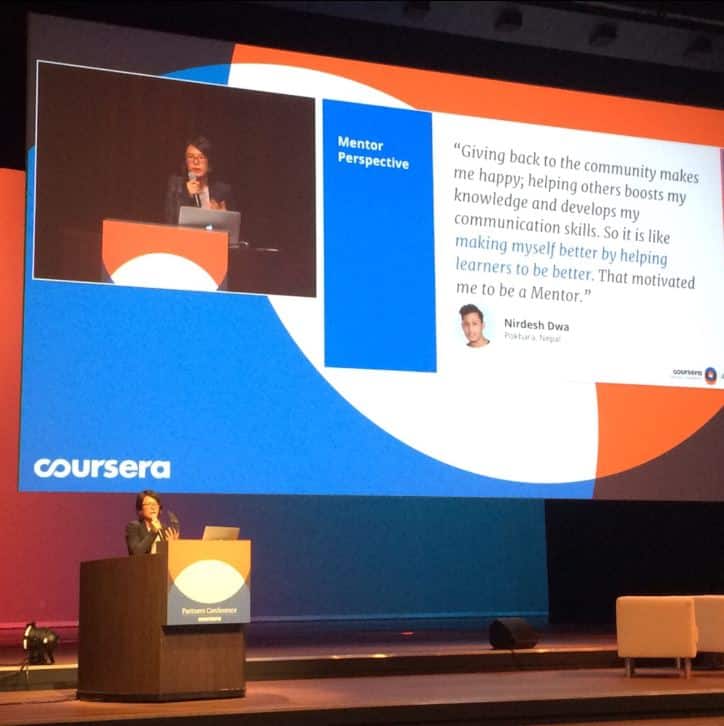
In 2016 an energizing, inspiring Coursera Partner Conference was held in the Hague. Prof. Len White arranged for me to attend the course, Ellen Vos-Wisse.
Coursera
The 2016 conference is the fourth annual Coursera Partners Conference. It good to realize that it is only four years since the first courses started. At the moment digital learning is maturing leading to stackable learning programs and even to Online Master’s.
In 2015 Coursera went back to technical basics for transition of all the courses to another platform. In 2016 there is a strong focus on opportunities and responsibilities in online learning . The conference theme was: Better Education for a Better World. The conference had three central topics: Advancing Pedagogy, Expanding Acces and Transforming Lives.
Medical Neuroscience at the Partner Conference, the Story of a MOOC

Courtny Lockemer, Communications Manager, Online Education Initiatives presents a poster on Medical Neuroscience ‘Story of a MOOC’, making clear the success story of our unusual course to the Coursera Partners. The infographic at the center of the poster can be viewed here Around the World and Back Again: The Story of a MOOC.
Coursera courses generally are fit for a broad target group of learners and are usually short courses that do not take much time each week. Medical Neuroscience is different. The course is designed for people that are enrolled in a health professions curriculum or are preparing to do so. To be successful in this course, a college-level background in cellular and molecular biology and general knowledge of systems physiology and human anatomy is strongly recommended. The intellectual challenge and content level of this course is comparable to what first-year students in the graduate-level health professions would experience and the course is expected to require 16-20 hours per week of effort. (To get an impression on the content of the course visit the page Learning Materials and have a look at the Summary of Pathways on that page, it is a summary with the most important material in the course).
From the course Staff and TAs, Nicholas Janes and Ellen Vos are present at the conference.

Coursera Partner Conference, active participation
Completion rates of Coursera’s project based courses are improving. On these courses were students have to work together actively there is far less dropout. ‘People learn from people’ is the motto. It is a strong didactic insight that stresses the importance of active learning communities with strong interactions.
The Coursera Partner Conference is a gathering of unique people open to innovation, transformation and willing to try new things for themselves. At this conference there were sparkling inspiring moments when we had to exchange ideas in little groups or with the person sitting next to you. Even at a conference active interaction with humans enriches the experience.
Mentors

I have been able to talk to Coursera Staff members about Mentors. Mentors are an important part of the human capital of Coursera, they moderate the on-demand courses. Mentors are very important for a good atmosphere on the discussion forum of the course and Coursera gives an online training program for candidate Mentors that are recruited from the course student population from courses that have been running for more than 3 months, either by Coursera or course staff. Current students and community TAs from this session of Medical Neuroscience can be added as Mentors soon after the course restarts on the new platform, candidate Mentors have to agree to participate for three months.